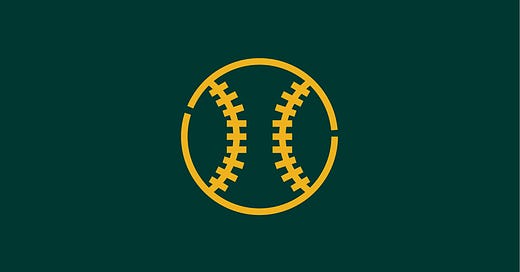Best 50 — 1910 Philadelphia Athletics (#46)
The A’s easily subdue the heavily favored Cubs in the World Series
The subject of today’s newsletter is the 1910 Philadelphia Athletics, who are No. 46 in the Best 50, my list of the greatest ballclubs in history. The rankings come from my new book, Baseball’s Best (and Worst) Teams.
Here’s a quick boilerplate explanation that I’m appending to every story in this series:
I compiled the Best 50 by analyzing 2,544 major-league teams from 1903 to 2024. Those clubs have been ranked by their team scores (TS), which are plotted on a 100-point scale. (A given club’s all-time percentile is the percentage of the other 2,543 teams that it outperformed.)
See my book for an explanation of my TS calculations. The book also offers separate breakdowns of the best and worst clubs for every decade and franchise, comprehensive profiles of the Best 50 (including position-by-position lineups and much more information than you’ll find in this newsletter), and similar summaries of the 10 worst teams of all time.
Now on to today’s profile.
Facts and figures
Team: 1910 Philadelphia Athletics
Team score: 85.207 points
All-time rank: 46 of 2,544
All-time percentile: 98.23%
Season record: 102-48 (.680)
Season position: First place in American League
Final status: World champion
Season summary
The Philadelphia Athletics slipped into mediocrity after winning the American League pennant in 1905. They dropped three years later to a 68-85 record, which placed them sixth in the eight-team league. Unhappy fans wondered when the A’s would ever regain their competitive spirit.
A positive answer wasn’t long in coming. The Athletics moved in April 1909 to America’s first steel-and-concrete stadium, Shibe Park, and they began to jell in their deluxe new home. They posted the AL’s best record over the final three months of the ’09 schedule. The surge came too late to overtake the pennant-winning Detroit Tigers, though it did propel the A’s to second place and raise their hopes for the future.
The sudden blossoming of a journeyman pitcher, Jack Coombs, sparked the Athletics in 1910. Coombs set an AL record with 13 shutouts, and Philadelphia’s staff topped the league with 24. The A’s built on the previous season’s momentum, racing to a seven-game lead by mid-July 1910. They eventually won the pennant by 14.5 games.
Baseball’s Best (and Worst) Teams
Get the complete lowdown on the 50 greatest (and 10 weakest) clubs of all time
Postseason summary
Chicago’s National League champions were installed as 10-7 favorites in the 1910 World Series. The Cubs had history on their side — they had won two of the previous three series — and they still had hard-bitten Frank Chance as their Peerless Leader. Another world title seemed inevitable.
But the Athletics easily subdued the Cubs in five games by a composite score of 35-15. Jack Coombs pitched three complete-game victories, and Philadelphia batted .322 as a team. (The latter would stand as a World Series record until 1960.) “There can be no question that the better team won,” said the Sporting News, “and no man would dare say that the victory of the Athletics over the Cubs was a fluke.”
Subscribe — free — to Baseball’s Best (and Worst)
A new installment will arrive in your email each Tuesday and Friday morning
Lineup summary
The Athletics’ everyday lineup was anchored in 1910 by future Hall of Famers at second and third bases.
Eddie Collins, the second baseman, enjoyed one of the greatest seasons of his 25-year career. He led the American League with 81 stolen bases, finished third in runs batted in (also 81), and ranked fourth in batting average (.324). Collins was unusually self-assured, bordering on arrogant, as his nickname of “Cocky” suggested. But even those who disliked him acknowledged his skill. “If anyone tells you he wasn’t the greatest second baseman of all time, you argue with him,” said Ty Cobb.
Third baseman Frank Baker was Collins’s polar opposite, a shy and quiet man. He was also extremely strong, swinging a 52-ounce bat. He had been dubbed “Home Run” Baker after flashing his power in 1909’s spring training. Baker’s total of 74 RBIs was sixth-best in the AL in 1910, though he defied his sobriquet by hitting only two homers.
Philadelphia was blessed with the best pitching staff in either league in 1910, and Jack Coombs emerged as the club’s undisputed (and unexpected) ace. Coombs had fashioned a pedestrian 35-35 record in his first four big-league seasons, but everything clicked in 1910. Hitters suddenly found his sharp overhand curve impossible to hit. Coombs topped the AL with 31 victories. “The Athletics will be in the World’s Championship Series this year,” the Sporting News concluded at the start of September, “and they have Jack Coombs to thank for the honor.”


